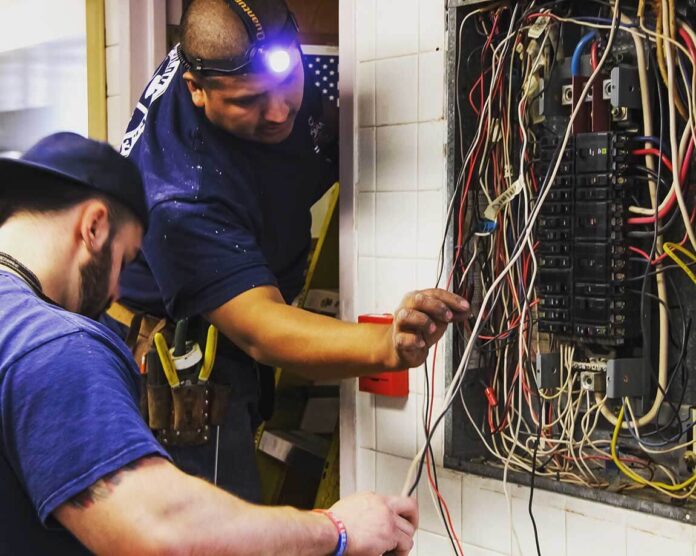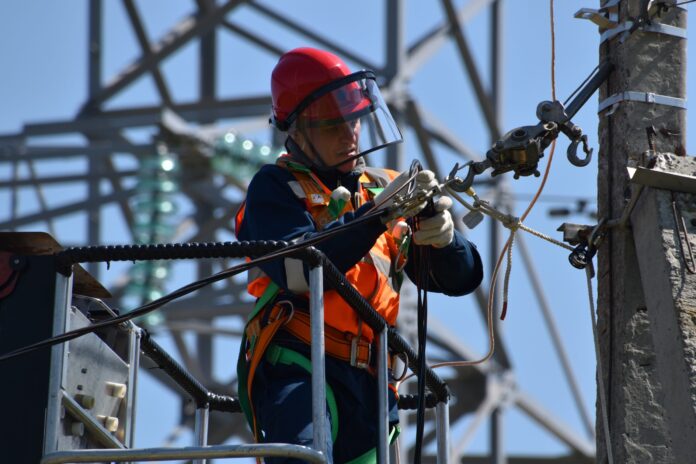Becoming an electrician has many advantages. They include a versatile timetable, financial stability, and the possibility of an excellent salary. As an electrician, you have the option of going into business for yourself, which might be more financially rewarding than working for someone else. There is a heavy burden of obligation, though. Starting an electrical business can be quite lucrative for the right person.
Work Responsibilities

Generally, electricians are responsible for the installation of electrical systems, including the wiring of homes and businesses. Maintenance and troubleshooting of these systems are also within their capabilities. Electricians identify circuit problems and replace damaged components. In order to do their job effectively, they need to be adept in troubleshooting and determining the root of any issues that arise.
The responsibilities of an electrician might range widely. They may be used on building sites to wire residences, commercial establishments, and industrial facilities. Electrical systems are installed in most structures so that people can use their electronic devices and operate machinery inside. Installing an electrical system during construction makes it easier to work with. Following completion of the building process, electricians will fix any damage to the electrical infrastructure and replace any worn-out components. Some other responsibilities of an electrician include inspection of completed work, estimation of expenses, and response to unexpected situations that require immediate attention.
Professional Electrical Contractors and High-Tech Houses

A residential electrician is someone who focuses on electrical systems in homes and typically makes multiple house calls each day. They could be experts in installing and configuring state-of-the-art home systems, such as smart home systems and electrical wiring to enable home charging systems for electrical vehicles (EV) and home energy-saving systems.
Outside lighting, power systems, and security alarms are all things that an electrician can be called upon to install at a residence, business, or manufacturing facility. They could also be responsible for routine system upkeep. In order to determine the placement of wires and other components, an electrician may need to study blueprints or decipher electrical diagrams. They could be using screwdrivers and other hand tools to install wires and other parts. They’ll use tools like ammeters and continuity testers to make sure everything’s hooked up properly and functioning properly.
Electricians usually work 35-40 hours per week. As much electrical work can’t be left unfinished, overtime is always a possibility. However, because of the unpredictable nature of the profession, many electricians are on call around the clock.
An Away-From-Home Work Environment
Unlike other workers who report to an office every day, electricians frequently spend time away from the office. Durations range from a single day to several months before moving on to other employment opportunities. These construction sites aren’t always close to the electricians’ houses.
Electricians who perform maintenance work a standard 40-hour week. As a rule, you can reach them between Monday and Friday. What they do may change depending on where they are employed. Technicians specializing in electrical maintenance typically perform repairs and upgrades to preexisting electrical infrastructure. It’s possible that they’re working on domestic fan or light installations. These services are growing in demand as people become more aware of the benefits of reducing their energy consumption. Repairs of machines’ motors, transformers, and generators, as well as work on other specialized tools and even industrial robots, may fall under their purview.
Many electricians focus on either maintenance or construction, but others have dual training. Many electricians find work in building construction, where they install electrical wiring and safety devices like smoke detectors. They can also have to work with construction blueprints.
Training

A licensed electrician is a trained expert in the safe and proper installation of electrical wiring in structures, power lines, and fixed machinery. Electricians provide routine upkeep on the system as well as the installation of new parts. Electricians can find work in a wide variety of industries. They could be employed to check the electricity at a construction site or to do repairs.
If you want a career as an electrician, you need to go to school for it. Work in the electrical industry can be quite hazardous; therefore, electricians need to be well-trained and knowledgeable to prevent injuries. An electrician’s work typically includes examining schematics, checking out gadgets, and fixing the wiring. In addition, they work together with other experts in the subject.
Manual Labor
The work of an electrician can be taxing on the body. As a rule, electricians must spend extended periods of time standing, stooping, and kneeling at work. The work also requires moving around a lot of heavy furniture and machinery. Nonetheless, compared to other building crafts, electricians’ physical needs are quite low.
Even while no laws mandate a physical examination for electricians, some employers may have unofficial standards. It is common practice to have such standards in place to guarantee that a candidate is physically able to perform the job.
Prospective Payouts
The salary of an electrician is highly sensitive to factors such as location and cost of living. An expert in Alaska, for instance, may expect to make roughly $10,000 more per year than their counterpart in Maine. Furthermore, local industries have a variety of effects on wage levels. The agriculture sector in Iowa, for instance, offers excellent pay for qualified electricians. Professionals in Texas’ oil industry can make a comfortable living.
Earning potential for an entry-level electrician in Richmond, Virginia, starts at roughly $44,000 annually. Seven years into the job, a qualified electrician in Richmond, Virginia may expect to make roughly $87,000 annually. A lot of variables, including the availability of electricians, affect this estimate. As a result of a shortage of qualified electricians, the demand for their services is at an all-time high. Consequently, an electrician’s salary is typically above that of a minimum-wage worker. The going rate for a licensed electrician with experience is $50 an hour.
Job Prospects

Beginning with training, an apprenticeship, or certification is the best way to enter the field of electrical work. It’s possible to advance from “novice” to “journeyman” status and then “master” status as one gains experience. If you decide to specialize in electrical systems, you’ll be able to advance in your career and make more money. Electrification work will continue to be in high demand for the foreseeable future.
A 4.5 percent growth in electrician jobs is forecasted over the next five years, according to data from the federal government. In contrast, the number of available jobs has not increased in tandem with this trend. For instance, Victoria saw the largest increase in wanted advertisements for workers. Meanwhile, job postings in New South Wales increased less than in any other state.









